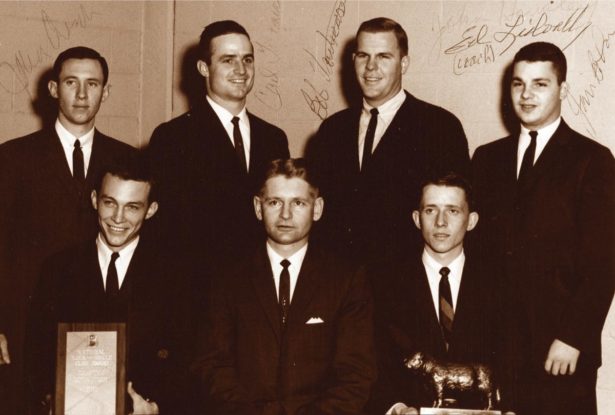Front row from left: Tom Looney (Knoxville ’62), advisor Ed Lidvall and John Housley (Knoxville ’64). Back row from left: John Crouch (Knoxville ’63), Carl Turner (Knoxville ’62) , Bob Vantrease (Knoxville ’63) and Jim Bohannon (Knoxville ’64). the team of agriculture students won the national livestock judging title 51 years ago.
By Diane Ballard
UT’s no stranger to national championships. One you may not recall, but that changed the course of six lives, came a half century ago when a team of Tennessee farm boys nabbed the 1962 national livestock judging title in Chicago.
The experience propelled the team members to career success and their advisor, the late Ed Lidvall, to legendary status. Bob Vantrease, who lives in Upperville, Va., contacted the Tennessee Alumnus with the idea for this article. He reported not only that theirs was the only team from a Southeastern university ever to win the national title but also that all six team members are still alive: Tom Looney lives in Crossville, Tenn., as does Jim Bohannon. Carl Turner resides in Covington, Tenn.; John Crouch in Taos, N.M., and John Housley in Riceville, Tenn. All are UT Knoxville and Institute of Agriculture alumni.
Lidvall “had been on a national championship team from Iowa State,” Vantrease wrote. “He was one of the best teachers in the country and remained friends with all of us until his death a couple of years ago.”
Livestock judging competitions teach students how to evaluate animals. Experienced judges can, for example, help meat packers know how much meat an animal will yield and help breeders predict how well males will pass on desirable traits or how well females will produce and care for offspring. Team activities help members with critical thinking, public speaking, teamwork and job placement.
The UT team actually tied for the championship with the team from South Dakota State University. Crouch says the trip was “a thrilling experience for six country boys,” but he’s still second-guessing himself, thinking he could have cost his team an outright victory.
“Each class of livestock contains four animals. In this particular class, there were three really desirable market hogs and a very short-sided, fat, extremely undesirable individual, to which I paid little attention, as it was the obvious last-place animal in the class. One detail I failed to notice was this undesirable animal was a gilt (female that’s never been pregnant), and the rest were barrows (castrated hogs.) When I finished giving reasons to support my placing, the judge asked me if I found a gilt in the class, to which I replied, ‘No, sir.’ In retrospect, had I observed the gilt, perhaps we would have been the sole winner.”
The trip to Chicago was, in itself, a learning experience. Apparently Lidvall was confident that his team was well versed in judging cattle but a little less so with hogs. So he planned stops along the way to sharpen their skills. “For five days as we traveled, we stopped each day at a university or a farm,” Bohannon recalls. “We got a steady diet of hogs and more hogs. Prof calculated exactly right, as we won cattle and were strong in swine to carry us to the championship.”
Bohannon eventually became a teacher himself and says Lidvall’s example guided him.
“At one stage of my career, when I was teaching vocational ag in high school and livestock evaluation at Tennessee Tech, any lesson plan I was working on, I would always stop and think, ‘How would Lid do this?’ He taught us to look and think and then talk accurately about what we had seen—a very important skill in life and any business dealings.”
All of the team members went on to successful careers in the livestock industry, Bohannon as an Angus and Chiangus breeder, Turner as owner of Claybrook Angus farm in Covington, Housley as a Guernsey breeder, and Looney as a cattleman and attorney in Crossville. Vantrease was an executive with two cattle associations and president of Heritage Place, an Oklahoma City horse auction company.
“Never would have accomplished this without the judging experience,” he avows. Ditto, says Crouch, who rose to chief executive officer of the American Angus Association.
“The relationships I developed as a result of my association with Prof. Lidvall and the UT livestock judging team members have remained with me throughout my life and career.”

